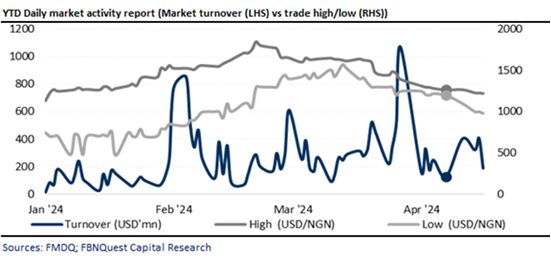News
Stronger Naira Likely to Hurt Non-oil Exporters

Today, we examine the recent developments in the Nigerian foreign exchange markets. We consider the impact of the measures implemented by the Central Bank of Nigeria (CBN) to support the Naira and promote foreign exchange inflows from Foreign Portfolio Investors (FPIs). The recent appreciation of the Naira can be attributed to the strategic interventions by the CBN, notably the clearance of a US$4.6bn of the verified backlog of foreign exchange claims, the implementation of the willing-buyer, willing-seller model in the fx market, and the removal of the allowable limit on exchange rates quoted by international money transfer operators (IMTOs), and the CBN’s enhancement of FX liquidity.

- In March, the CBN commenced weekly dollar sales of US$10,000 to registered Bureau De Change (BDCs) at N1,251/USD. BDCs were directed to sell to eligible customers at a maximum rate of 1.5% above the purchase price.
- This has resulted in an over 34% appreciation of the Naira against the dollar on the official market, according to data from the Financial Market Dealers Quotations (FMDQ).
- Although the Bank’s efforts to increase foreign exchange liquidity have resulted in the appreciation of the Naira relative to major foreign currencies, there are concerns about its impact on the gross official reserves.
- According to CBN data as of April 16th, the gross official reserves balance amounted to US$32.2bn, marking a -6.4% month-on-month and -2.4% year-to-date decrease from US$34.4bn (March 15th) and US$33bn (January 2nd), respectively.
- However, despite the challenges posed by lower receipts from crude oil sales due to theft and pipeline vandalism, the reserve balance is expected to receive a boost with the anticipated US$1.1bn Afreximbank loan in May.
- Furthermore, the recent monetary policy measures implemented by the CBN are expected to provide support in the near term while longer-term measures are being implemented






